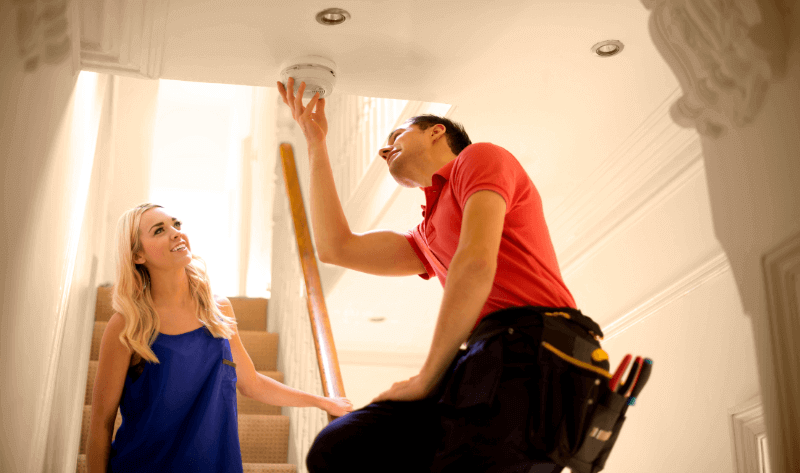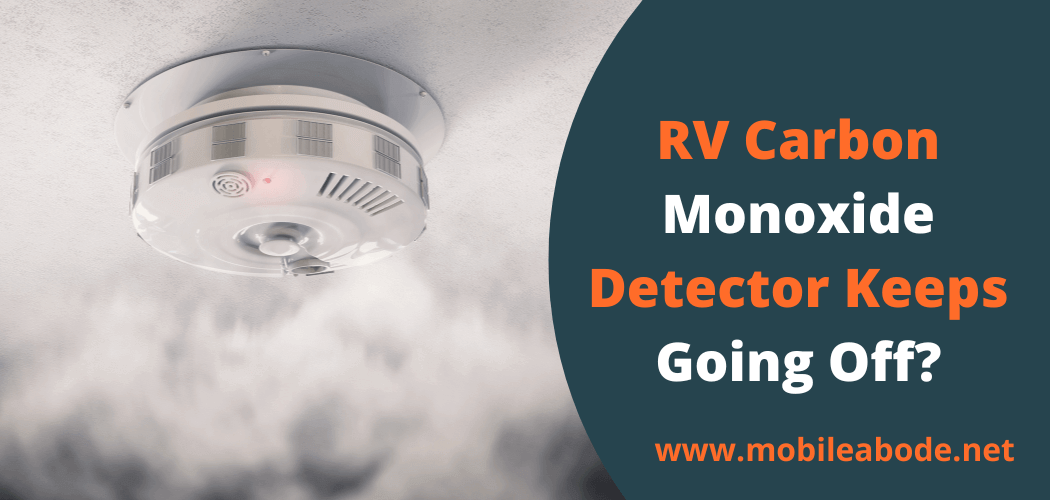What does a carbon monoxide detector do and why is it important to have one in an RV?
A carbon monoxide detector is a device that detects the presence of carbon monoxide (CO) in the air. Carbon monoxide is a colorless, odorless, and tasteless gas that is produced by burning fuel. It is found in combustion fumes, such as those produced by cars, trucks, generators, stoves, lanterns, and grills. CO can build up indoors and pose a health hazard.
RVs typically have a lot of fuel-burning appliances, which means they are at a higher risk for carbon monoxide buildup. That’s why it’s important to have a carbon monoxide detector in an RV.
A detector will sound an alarm if it detects a high level of CO, alerting you to the danger so you can take action to avoid exposure.
There are two main types of carbon monoxide detectors: battery-operated and plug-in.
Battery-operated detectors are portable and can be placed anywhere in the RV. Plug-in detectors must be plugged into an outlet, but they offer the benefit of being able to monitor multiple areas at once.
Why Does My RV Carbon Monoxide Detector Keep Going Off?
There are a few reasons why your RV carbon monoxide detector might keep going off:
- The batteries need to be replaced.
- There is too much carbon monoxide in the air.
- The detector is old and needs to be replaced.
- The detector is placed too close to a fuel-burning appliance.
- The detector is placed in an area with poor ventilation.
If your carbon monoxide detector keeps going off, you should take action to address the problem. Start by replacing the batteries if they are low. If that doesn’t solve the problem, try moving the detector to a different location. If the detector is old, it may need to be replaced.
It’s also a good idea to have your RV inspected by a qualified technician to make sure there are no safety issues that need to be addressed.
If your RV carbon monoxide detector keeps going off, you should take action to find out the cause and correct it. Don’t ignore the problem, as it could be a serious safety hazard.
Things to do when RV Carbon Monoxide Detector Goes Off?
If your RV carbon monoxide detector goes off, it’s important to take action immediately:
- Turn off all fuel-burning appliances and vents in the RV.
- Open all doors and windows to ventilate the RV.
- Get everyone out of the RV, and go to a safe location away from the RV.
- Call for medical help if anyone is feeling sick.
- Do not reenter the RV until it has been checked by a qualified technician.
It’s important to take carbon monoxide poisoning seriously and to get out of the RV immediately if the detector goes off. Carbon monoxide can cause serious illness or death, so it’s important to get fresh air and seek medical help right away.
These tips can help you prevent carbon monoxide buildup in your RV and keep you and your family safe.
By regularly testing and replacing your RV carbon monoxide detector, you can make sure that it is working properly and that you are alerted to any potential dangers. If your detector does go off, it’s important to take action immediately and get everyone out of the RV. Seek medical help if anyone is feeling sick, and do not reenter the RV until it has been checked by a qualified technician.
How to Replace an RV Carbon Monoxide Detector?
It’s important to regularly test and replace your RV carbon monoxide detector if needed. Most detectors have a lifespan of 5-7 years, But you may also need to replace them sooner if it becomes damaged or malfunction.
It’s a good idea to keep spare batteries on hand so you can quickly replace them if the detector sounds an alarm. You should also check the batteries regularly to make sure they are still working.
Steps to replace an RV carbon monoxide detector:
- Turn off all fuel-burning appliances and vents in the RV.
- Open all doors and windows to ventilate the RV.
- Remove the old detector from its mounting bracket.
- Dispose of the old detector according to the manufacturer’s instructions.
- Install the new detector in the mounting bracket.
- Follow the manufacturer’s instructions for testing the new detector.
- Close all doors and windows, and turn on fuel-burning appliances and vents.
- Monitor the new detector to make sure it is working properly.
Replacing an RV carbon monoxide detector is a simple process, but it’s important to do it properly to maintain safety in your RV.
FAQs about Camper Carbon Monoxide Detector Beeping

How often should I test my RV carbon monoxide detector?
It’s a good idea to test your RV carbon monoxide detector once a month. You can do this by pressing the test button on the detector. This will cause the alarm to sound, letting you know that the detector is working properly.
The alarm should sound within 30 seconds. If it doesn’t, replace the batteries and try again. If the detector still doesn’t work, it may need to be replaced.
It’s also a good idea to clean your RV carbon monoxide detector regularly. Use a vacuum with a soft brush attachment to remove dust and debris from the sensor.
How to tell if your carbon monoxide detector is malfunctioning?
There are a few signs that your carbon monoxide detector may be malfunctioning:
- The detector goes off frequently, even when there is no carbon monoxide present.
- The alarm sounds weak or faint.
- The detector doesn’t sound an alarm when carbon monoxide is present.
- The detector is more than 5 years old.
If you notice any of these signs, it’s important to replace the detector right away. A malfunctioning detector could put you and your family at risk of carbon monoxide poisoning.
How To Prevent Carbon Monoxide Buildup In An RV?
Here are some tips for preventing carbon monoxide buildup in an RV:
1. Don’t leave fuel-burning appliances running while you are sleeping or away from the RV.
2. Use appliances that are designed for outdoor use only, such as grills and lanterns.
3. Don’t use portable generators inside the RV, and don’t run them while sleeping or away from the RV.
4. Make sure all fuel-burning appliances are properly vented to the outside.
5. Keep doors and windows open to increase ventilation when using fuel-burning appliances.
6. Don’t idle the engine of a car or truck while it is attached to the RV.
7. Have your RV’s exhaust system checked regularly by a qualified technician.
8. Install a carbon monoxide detector in your RV.
9. Be sure to follow the manufacturer’s instructions for all fuel-burning appliances.
10. If you start to feel sick while in the RV, get fresh air immediately and call for medical help.
These tips can help you prevent carbon monoxide buildup in your RV and keep you and your family safe.
Final Thoughts
The reason your carbon monoxide detector is going off could be any of a number of things. It might be an electrical problem, it might be that you have a gas leak, or there could be another source of carbon monoxide in your home.
You should always call the professionals to come and test for CO levels if your alarm goes off–doing so could save your life.
If it turns out that you do have a carbon monoxide leak, take steps to fix it immediately.

